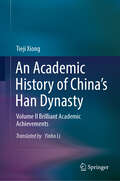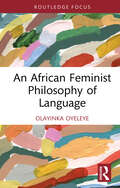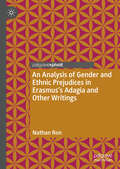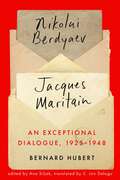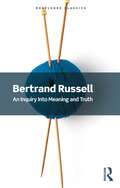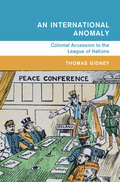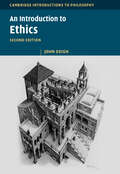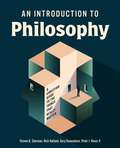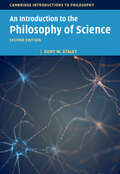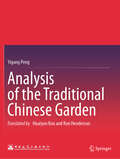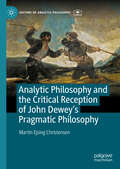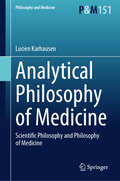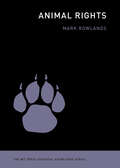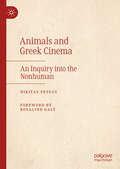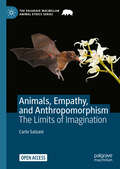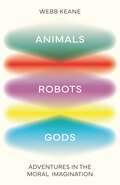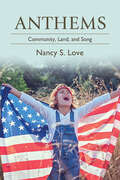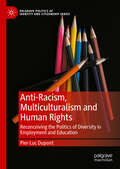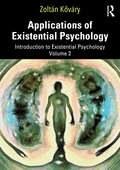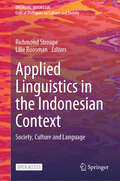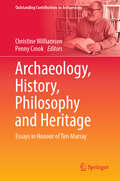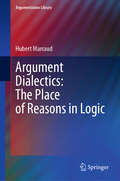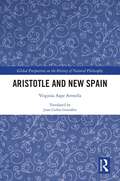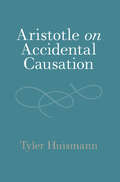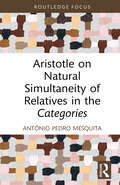- Table View
- List View
An Academic History of China’s Han Dynasty: Volume II Brilliant Academic Achievements
by Tieji XiongThis book examines the academic legacy of the Han dynasty. It explicates the line between the explaining of a classical text (训诂) and the study of classical texts and their interpretation (训诂学). The study of hermeneutics was developed already, including the Chinese specific figure, meaning, sound, interpretation, and rites and systems. It details analyses of the Confucian School, Daoist School, Yin-Yang School, Legalist School, Terminologist School, Mohist School, Political Strategist School, Syncretist School, Agriculturalist School, and Literalist School. Among important classical works of the Han Dynasty examined throughout the book Shiji, Hanshu and Hanji are deeply analysed. Referring to various works during the Earlier and Later Han Dynasty, the author details categories of historiographical writing, i.e., the category of classical, official, and miscellaneous history, and different branches of analysis and interpretation.The book expatiates chapters on astronomy, mathematics, geography, agriculture, and medicine. Among these are the three theories on sky, the mathematics, map drawing, ox-plowing, an agricultural treatise, water project examinations, and the process of knowledge transfer and advancement in medicine during the Han Dynasty.
An African Feminist Philosophy of Language (ISSN)
by Olayinka OyeleyeThis book calls for the institution of an African feminist philosophy of language, challenging existing debates and encouraging a move away from the Western gaze.The book begins with an analysis of the philosophical context of African feminism, and a call for the decolonization of epistemological discourse. Oyeleye then goes on to consider how indigenous patriarchies play out in the cultural reality of the Yorùbá in particular, ontologically unpacking the nature of woman as expressed in language, especially in myths and proverbs. Challenging the derogatory language found in proverbs which entrench patriarchal oppression, the author advocates for feminist postproverbials: new proverbs which draw on old traditions but reconstruct the space of woman in a new, egalitarian rhetorical tradition. The author concludes by outlining the conditions necessary for African feminist philosophers to consider language as a decolonizing space which can help to push through the agenda of social change.This book will be an important resource for researchers from across the fields of gender and women studies, feminist philosophy, philosophy of language, cultural studies, and African studies.
An Analysis of Gender and Ethnic Prejudices in Erasmus's Adagia and Other Writings
by Nathan RonThis book explores Erasmus's ethnic and gender prejudices. It does not in any way seek to undermine the esteem in which Erasmus is generally held, as a prince of the humanists; it is rather a consideration of common early modern prejudices. The book&’s principal innovation is the use of Erasmus&’s commentaries on thousands of Greek and Roman proverbs (his adagia) as a source for examining Erasmus&’s worldview. Researchers have often considered the adages as not voicing or reflecting Erasmus&’s views, and as such have chosen to ignore them. However, this book shows that Erasmus occasionally expresses his opinions through the adages, giving us an invaluable window into his worldview. An Analysis of Gender and Ethnic Prejudices in Erasmus's Adagia and Other Writings is essential reading for all scholars and researchers of early modern philosophy and intellectual history especially those researching the thought of Erasmus.
An Exceptional Dialogue, 1925–1948: Nikolai Berdyaev and Jacques Maritain
by Bernard HubertIn 1924 the Russian Orthodox philosopher in exile Nikolai Berdyaev ended up in the environs of Paris, where he met and befriended the French Catholic philosopher Jacques Maritain. Coming from different faiths and disparate cultures, they shared a common desire to assert the essential dignity and rights of the human person in an era torn apart by extremism and conflict. They embarked on a joint endeavour to promote ecumenical dialogue and philosophical conversation in interwar Europe. Their collaboration was instrumental in developing a philosophy of Christian personalism and seminal in the emergence of existentialism.Newly translated into English, An Exceptional Dialogue, 1925–1948 reproduces the two thinkers’ correspondence, along with Bernard Hubert’s original introductory essay, his notes to the French edition, and a new introduction by Ana Siljak. An intimate and remarkable portrait emerges. The two men met and corresponded often during their two decades of friendship, their homes became spaces for conversations on religion and philosophy, and together they contributed to the development of a Christian humanism and personalism that inspired such disparate figures as Hannah Arendt and Martin Luther King Jr and that influenced Maritain’s work on the United Nations Universal Declaration of Human Rights.An Exceptional Dialogue, 1925–1948 reveals the connectedness between Russian and European thought, explores the contributions of French-Russian personalism to the history of human dignity, and provides insight into a strain of philosophy often ignored in contemporary scholarship.
An Inquiry Into Meaning and Truth (Routledge Classics)
by Bertrand RussellIn An Inquiry Into Meaning and Truth, Bertrand Russell returns to philosophy after a long period of writing about education, religion and marriage. Investigating how we can be justified in what we know and how we can reconcile knowledge of the physical world with immediate sensory knowledge, Russell sets out to reconcile the various aspects of his thought since his early logicist period—the view that mathematical truths are ultimately logical truths.Russell's goal is to stress-test empiricism in light of contemporary developments in logic and language or, as Russell himself succinctly puts it, "to combine a general outlook akin to Hume's with the methods that have grown out of modern logic". His quest combines three strands: metaphysical, epistemological and linguistic.Both a fascinating insight into Russell’s evolving views and the continuity of his thinking over the years, it also foreshadows many future debates which came to occupy centre stage within English-speaking philosophy: debates about realism and anti-realism, the viability of pragmatism as a philosophical theory and the perennial opposition between holism and atomism.This Routledge Classics edition includes a new Foreword by Pascal Engel, placing Russell's book in helpful philosophical context.
An International Anomaly: Colonial Accession to the League of Nations (Global and International History)
by Thomas GidneyIt is often assumed that only sovereign states can join the United Nations. But this was not always the case. At the founding of the United Nations, a loophole drafted by British statesmen in its predecessor organisation, the League of Nations, was carried forward, allowing colonies to accede as member-states. Colonies such as India, Ireland, Egypt, and many more were afforded a tokenistic representation at the League in Geneva during the interwar years, decades before their independence. Thomas Gidney unites three geographically distinct case studies to demonstrate the evolution of Britain's policy from a range of different viewpoints, exploring how this policy came into being, and why it was only exploited by the British Empire. He argues that this membership shaped colonial norms around sovereignty and international recognition in the interwar period and to the present day. This title is also available as open access on Cambridge Core.
An Introduction to Ethics (Cambridge Introductions to Philosophy)
by John DeighNow in an expanded and revised second edition, this book offers clear, penetrating examination of the central questions of ethics through study of the most important ethical theories in Western philosophy. Readers are introduced not only to the main ideas of each theory but also to contemporary developments and defenses of those ideas. Among theories the book covers are egoism, the eudaimonism of Plato and Aristotle, act and rule utilitarianism, modern natural law theory, Kant's moral theory, and existentialist ethics. Two new chapters add to this coverage expositions of Hume's ethics, Sidgwick's program for defending utilitarianism, and Rawls's hypothetical contractarianism. The discussions throughout draw the reader into philosophical inquiry through argument and criticism that illuminate the profundity of the questions under examination. Students will find this book to be a helpful guide to how philosophical inquiry is undertaken as well as to what the major theories of ethics hold.
An Introduction to Philosophy: A Christian Guide to the Things that Really Matter
by Steven B. Sherman Richard A. Holland Gary S. Osmundsen Peter J. RasorDesigned for students in Christian colleges and seminaries, An Introduction to Philosophy surveys the four main areas of philosophy - logic, metaphysics, epistemology, and ethics - in an accessible and engaging manner. Yet it also covers important topics sometimes left unaddressed in introductions, including:why philosophy matters in our daycritical thinking and intellectual virtuea brief history of philosophyphilosophical hermeneuticsthe relationship between philosophy, faith, and worldviewreligious epistemologybioethics, sexual ethics, other types of ethicsa Christian philosophy of lifeGrounded in the Christian intellectual tradition, each chapter in An Introduction to Philosophy includes student-friendly features such as chapter summaries, explanatory sidebars, reflection questions, vocabulary words and definitions, and suggestions for further reading. Professors and students will find it to be a broad and useful overview, perfect for undergraduate and seminary students alike.
An Introduction to the Philosophy of Science (Cambridge Introductions to Philosophy)
by Kent W. StaleyThis thoroughly updated second edition guides readers through the central concepts and debates in the philosophy of science. Using concrete examples from the history of science, Kent W. Staley addresses questions about what science is, why it is important, and the basis for trust in scientific results. The first part of the book introduces the central concepts of philosophy of science, with updated discussions of the problem of induction, underdetermination, rationality, scientific progress, and important movements such as falsificationism, logical empiricism, and postpositivism, together with a new chapter on social constructionism. The second part offers updated chapters on probability, scientific realism, explanation, and values in science, along with new discussions of the role of models in science, science in policy-making, and feminist philosophy of science. This broad yet detailed overview will give readers a strong grounding in philosophy of science whilst also providing opportunities for further exploration.
Analysis of the Traditional Chinese Garden
by Yigang PengAnalysis of the Traditional Chinese Garden is a seminal resource for the spatial principles and techniques that shape traditional Chinese gardens. It is a richly illustrated resource for historians, theorists, garden designers, landscape architects, architects and anyone interested in the design of these world renowned gardens with 106 pages of hand-drawn sketches by the author that vividly portray the intricacies and subtleties of traditional Chinese gardens. The book is widely known in China as a primary text for analysis of the gardens and was recognized with the inaugural National Excellent Architectural Book Award in 1990 and, since its debut in China in 1986, has garnered immense popularity and acclaim with 50 reprints and a total print run of 150,000 copies.
Analytic Philosophy and the Critical Reception of John Dewey’s Pragmatic Philosophy (History of Analytic Philosophy)
by Martin Ejsing ChristensenThis book examines the critical reception of Dewey&’s pragmatic philosophy by six prominent analytic philosophers and relates it to the contested history of analytic philosophy and Deweyan pragmatism. It argues that analytic philosophers&’ critical reception of Dewey&’s pragmatist philosophy has, from the very beginning, been marred by externalist readings that do not engage with Dewey&’s thinking from the inside, and suggests that this throws doubt upon the new revisionary histories of analytic philosophy and Deweyan pragmatism according to which the marginalization of Dewey&’s pragmatism represents the sensible result of critical processes of reasoning. At the same time, however, the book also points out that Dewey and his analytic critics in fact share several worries and suggests that these common concerns might serve as points of reference for more fruitful dialogues across the traditions of analytic philosophy and Deweyan pragmatism in the future.
Analytical Philosophy of Medicine: Scientific Philosophy and Philosophy of Medicine (Philosophy and Medicine #151)
by Lucien KarhausenThis book describes the philosophy of medicine as a subset of the philosophy of science. It is grounded in an epistemological bottom-up account that arises from the clinical situation, the epidemiologic and the resulting public health account. The volume offers a set of coherent beliefs that are deductively closed, which means that any statement which is logically entailed by the theory belongs to the theory. Medicine does not originate, as usually admitted, with the notion of disease inasmuch as concepts of disease, malfunction or health are evolved, sophisticated and advanced constructs. Medical norms, i.e., pathological features, are logically and conceptually prior to normal features. Following Ludwig Wittgenstein, by analogy with the way members of a family resemble each other, diseases are often what Ludwig Wittgenstein called “family-resemblance concepts”, which manifest a similarity shared by things classified into certain groups in the way members of a family resemble each other: each shares characteristics which many but not all the others, and there are no necessary or sufficient conditions for belonging in that classification. This book analyses the confusions associated with the concept of health, and subsequently turns to medical interventions, preventive, therapeutic and palliative as well as to the caring relationship, patients’ autonomy, doctors’ authority, and paternalism. Finally, the epistemic, ethical, or ontological limits of medicine, are being discussed, and the final account leaves us at the end of the scale with the perspective afforded by the patient facing suffering, impairment, death and tragedy, not to mention the physician’s predicament, which give rise to the principle that undergirds them all, i.e., the value of life.
Animal Rights (The MIT Press Essential Knowledge series)
by Mark RowlandsA fresh view of animals and what we owe them.Do animals have moral standing? Do they count, morally speaking? In Animal Rights, Mark Rowlands argues that they do and explores the implications of this idea. He identifies three different waves in animal rights writing. The first wave was defined by a traditional dispute between utilitarianism (represented by Peter Singer) and rights-based approaches (represented by Tom Regan) to ethics. The second wave was defined by an expansion in a conception of ethics, which saw utilitarian and rights-based approaches supplemented by other ethical traditions, including contractualism, virtue ethics, and care ethics. The third wave was defined by an expansion in our conception of animals, driven by exciting new developments in the field of comparative psychology.Each of these waves had ramifications for how we understand the moral status of animals, but, this book argues, and reinforces, the core idea that animals deserve moral respect. In earlier waves, discussions of animal ethics had been focused on the issue of animal suffering. But the third wave is defined by the idea that animals are far more than merely sufferers or enjoyers of experiences but are instead authors of their own lives: creatures capable of choosing how to live, shaped by a conception of their life and how they would like it to go. Rowlands writes that, no matter what moral theory you choose, the most plausible version of that theory entails that animals have moral standing and that our obligations to them are far more substantial than many of us care to acknowledge.
Animals and Greek Cinema: An Inquiry into the Nonhuman
by Nikitas FessasThis book offers a non-anthropocentric account of a national cinema. Drawing on cutting-edge developments in Animal (film) studies, the book gathers a wide range of species and genres to discuss the Greek cinematic animal. This en-tails recalibrating the readers&’/viewers&’ gazes to include particular nonhumans, often displaced in the frame&’s margins. While acknowledging the cost paid in animal suffering for Greek cinema to rise, the book features instances of animal-human bonding. Combining close readings with interviews with directors, human actors, screenwriters, cinematographers, producers, special effects artists, and animal wranglers, this book proposes a paradigm of human-animal praxis, arguing that revisiting nonhuman images can lead to renewed ethical relations, and to less speciesist cinemas, film industries, and societies.
Animals, Empathy, and Anthropomorphism: The Limits of Imagination (The Palgrave Macmillan Animal Ethics Series)
by Carlo SalzaniThis open access book explores the role of imagination in animal ethics and its constitutive links to empathy/sympathy and anthropomorphism. The book argues for the constitutive role of imagination in ethical deliberation, but acknowledges that there exist important limits to its use. However, &“limit&” is here understood not merely negatively as restriction and insufficiency, but rather positively as &“condition of possibility,&” so what the book explores and analyses are the conditions for a positive and fruitful use of the imagination in ethics. The book uses as a &“frame&” the questions and issues raised in J.M. Coetzee&’s The Lives of Animals to explore some central and salient themes.
Animals, Robots, Gods: Adventures in the Moral Imagination
by Webb KeaneA mind-expanding exploration of the ethical bonds we share with the nonhumanMoral relationships saturate the living world, and the line between the human and nonhuman is blurrier than we might think. Animals, Robots, Gods provides a bold new vision of ethics defined less by the individual mind or society and more by our interactions with those around us, whether they are the pets we keep, the gods we believe in, or the machines we endow with life.Drawing on pioneering fieldwork around the globe by some of today&’s leading researchers, acclaimed anthropologist Webb Keane invites us to expand our moral imagination. We learn about the ethical dilemmas of South Asian animal rights activists, Balinese cockfighters, cowboys, and Japanese robot fanciers. We meet a hunter in the Yukon who explains to a bear why it must come out of hibernation and generously give itself up to him, a cancer sufferer in Thailand who sees his tumor as a reincarnated ox, and a computer that persuades users to confess their anxieties as if they were patients on a psychiatrist&’s couch. Through these and other stories, Keane challenges us to rethink our most basic ideas about who—and what—we deem worthy of moral consideration.Brimming with charm, wit, and insight, Animals, Robots, Gods reveals how centuries of conversations between us and nonhumans inform our conceptions of morality and will continue to guide us in the age of AI and beyond.
Anthems: Community, Land, and Song (SUNY series in New Political Science)
by Nancy S. LoveAn examination of struggles for national sovereignty and social justice as seen through patriotic anthems and songs of resistance.Anthems are songs of loyalty and devotion with religious or quasi-religious meanings, typically associated with nation-states. Singing patriotic songs together encourages a sense of shared identity and unified community among citizens. Anthems compares traditional American anthems, such as "The Star-Spangled Banner" and "America the Beautiful," with anthems of resistance from contemporary social movements, such as Occupy Wall Street, Black Lives Matter, and Standing Rock. Although seldom fully recognized by political scientists, musical song plays a significant role in struggles for national unity and social justice. While America's national anthems celebrate a unitary (white) nation, these alternative anthems challenge the definition of sovereignty as property that characterizes modern Western democracies. They offer an alternative vision of a multicultural democracy still struggling to emerge. Written from an interdisciplinary perspective on culture, economics, and politics best described as critical theory, Anthems is intended for scholars, students, and, most important, citizens.
Anti-Racism, Multiculturalism and Human Rights: Reconceiving the Politics of Diversity in Employment and Education (Palgrave Politics of Identity and Citizenship Series)
by Pier-Luc DupontThe continuing prevalence of racial inequality and discrimination is well documented in Britain. While there are multiple accounts of how state institutions are shaped by and reproduce racism, much less has been said about their current and potential contribution to anti-racism. This book elucidates the long-term impact on racism of positive action in employment and multicultural school curricula. It also explores whether international human rights law creates a duty for states to adopt these policies. Positive action and multicultural curricula are not new and have long been advocated by multiculturalists, but this book systematically unpacks how they can counter four structural drivers of racism: racialised national identities, racialised power inequalities, racial fearmongering, and racial segregation. The book goes on to examine the extent to which they have been implemented in Britain, as well as the legal and political opportunities for future development.
Applications of Existential Psychology: Introduction to Existential Psychology Volume 2
by Zoltán KőváryThe second in a two-part set, this volume offers a detailed examination of the application of existential psychology.This book begins by looking at the "conditio humana" – the most important topics of existential psychology, including anxiety, freedom, choices, authenticity, suffering and meaning, creativity, togetherness, time and death. It then moves through the practical application of existential psychology in the context of dreams, research, pathology and therapy. Examining key theories, models and research, the volume offers a fascinating overview of how the disciplines of art, philosophy, literature, science and theology contribute to a deeper understanding of personal self-knowledge and a person’s sense of purpose. This unique transdisciplinary approach demonstrates how readers can apply philosophical, historical and artistic aspects of existential psychology to their lives. The book concludes by considering the role of existential psychology in the present.Going beyond the questions of therapy and counselling that typically make up the study of existential psychology, the book offers the ultimate introduction for students and scholars of this fascinating and deeply rooted discipline. It may also interest professionals working in related fields.
Applied Linguistics in the Indonesian Context: Society, Culture and Language (Engaging Indonesia)
by Richmond Stroupe Lilie RoosmanThis open access edited volume presents a series of studies utilizing a variety of linguistic research techniques to investigate areas of language education, acquisition and assessment, contemporary political debate, modern and historical print media, and clinical language disorders, in the Indonesian context. In doing so, the authors provide a rich and diverse overview of current research in the fields of linguistics and applied linguistics. The initial section focuses on research conducted in educational settings, focusing on English-medium instruction (EMI), reading assessment, discovery-based learning, cultural elements in textbooks, and pre-service teacher preparation in Indonesia, offering recommendations for improving language education. The second section demonstrates the applications of corpus linguistics, focusing on collocation patterns in different languages, lexical use and context of rhetorical markers, and authorship determination. A third section presents investigations related to aspects of historical and contemporary language use in a variety of contexts, including advertisements, political debate, Indonesian print media, and translanguaging and multilingual writings, discussing the social and cultural dimensions of language use in Indonesia. The final section focuses on clinical linguistics, investigating the relationship between language disorders and language use, including spoken narratives provided by patients with Alzheimer's and the structure and time reference use of agrammatic speakers, with valuable insights into the understanding, diagnosis and treatment of language disorders. Brought together in a single volume, the chapters illustrate how linguistic analysis can be applied across a variety of disciplines and research sites. The volume is relevant to linguists, educators, sociologists, historians, and members of the medical community with particular interest in the Indonesian context.
Archaeology, History, Philosophy and Heritage: Essays in Honour of Tim Murray (Outstanding Contributions to Archaeology)
by Penny Crook Christine WilliamsonThis festschrift volume celebrates Tim Murray&’s significant and wide-ranging contribution to archaeological thought and practice. It includes 27 papers by Tim Murray&’s colleagues, research collaborators and students—former and current. Together these comprise a substantive and reflective contribution to Archaeology, History, Philosophy and Cultural Heritage in Australia, Oceania, China, India, the United Kingdom, Northern Europe, and North America. The collected papers in this volume tie together Murray&’s research into the history (or historiography) of archaeological thought, and his commitment to understanding the material culture of the past to &‘write history&’. They provide a cross-section of philosophical enquiries and substantive research: from epistemological studies of shared lexicons and important debates in the history of archaeological thought, to the minutae of material culture studies. Several papers explcitly and implicitly explore one of Murray&’s great interests: the role of heritage preservation in our exploration of the past, including dedicated tertiary training programs for Indigenous Australians to manage, research and protect their own Country. The book is divided into four parts: History, Archaeology, Philosophy and Heritage, offering an interdisciplinary approach to the study of the past. This volume would be of interest to archaeologists, historians, philosophers of archaeology, and heritage scholars.
Argument Dialectics: The Place of Reasons in Logic (Argumentation Library #45)
by Hubert MarraudThis book is a systematic exposition of Argument Dialectics (AD). Despite its name, argument dialectics is a logical approach to argumentation theory. AD stands out among theories of argument because of three unusual features: it is reasons-based, holistic and particularistic. This implies that AD conceives of logic as a theory of the dialectical construction of reasons, not as a theory of inferences. Consequently, contrary to other logical approaches, AD focuses on the study of inter-argumentative relations, especially those of opposition and weighing. The book makes an extensive use of the theory of reasons, a branch of metaethics that has been a very valuable quarry of intuitions and concepts for the elaboration of a reason-based theory of argument. The oppositions generalism-particularism and atomism-holism, proposed by Jonathan Dancy, which play a central role in the book and in the development of AD, have been adapted from the theory of reasons, and the same can be said of the distinction between different statuses of reasons that AD associates with different kinds of counterarguments. Conceiving of the theory of argument in terms of reasons has the effect of situating the paradigm of argumentation in practical argumentation/reasoning &“about what to do&” rather than in theoretical argumentation &“about what to believe&”, as inference-based theories do. Hence, this book is of interest to argumentation theorists, communication theorists, epistemologists, linguists, moral philosophers, and philosophers of law.
Aristotle and New Spain (Global Perspectives on the History of Natural Philosophy)
by Virginia Aspe ArmellaThis book is a detailed exploration of the Hispanic intellectual context and the different Aristotelian traditions that prevailed until the 16th century. Through a review and contextualisation of Aristotelian thinkers and texts, it argues that a unique Aristotelian tradition was formed in New Spain.The characteristic differences of Novohispanic Aristotelianism are a consequence of five factors: contact with the autochthonous cultures of America, the impact of the colonial organisation, the influence of the Salamanca humanist tradition, the presence of the Italian Aristotelianism of Renaissance translators in the university curricula and in the intellectual polemics of the time, and a peculiar assimilation of primitive and Old Testament Christianity in relation to indigenous people. This book analyses the works of Alonso de la Veracruz, Bartolomé de las Casas, Bernardino de Sahagún, Sor Juana Inés de la Cruz, Carlos de Sigüenza y Góngora, and Francisco Xavier Clavijero, reconsidering them in light of the history of ideas in New Spain and the contributions of Byzantine translators. It also offers a reflection on the problem of addressing Mexican colonial sources.This volume will be of interest to undergraduate and postgraduate philosophy students, as well as to researchers focused on Aristotle, Renaissance philosophy, or Latin American studies.
Aristotle on Accidental Causation
by Tyler HuismannIn this major new study, Tyler Huismann connects Aristotle's natural philosophy to modern theories of causation and provides fresh interpretations of classic issues. He links two of the most important notions in Aristotle's philosophy, accidents and causes, and using the concept of accidental causation as a guide, argues for ground-breaking proposals on some of the most foundational areas of Aristotle's thought: the relation between substances and accidents, the nature of efficient causation, the workings of 'qua,' the possibility of uncaused events, and the role of accidental causation in the natural world. Structured around close readings of Aristotle's Physics and Metaphysics and informed by contemporary theories of causation, Huismann's book offers students an accessible treatment of some of Aristotle's core texts, and provides specialists with a series of provocative interpretations.
Aristotle on Natural Simultaneity of Relatives in the Categories (Routledge Focus on Philosophy)
by António Pedro MesquitaThis book addresses the issue of natural simultaneity of relatives, discussed by Aristotle in Categories 7, 7b15– 8a12. Natural simultaneity is a form of symmetrical ontological dependence that holds between items that are not causally linked. In this section of the Categories, Aristotle introduces this topic in his analysis of relatives and maintains that although relatives seem to be for the most part simultaneous by nature, there seem to be some exceptions. He mentions two pairs of relatives as exceptions, namely the pairs knowledge/knowable and perception/perceptible, and argues at length for the priority of the second relative over the first one in each case. Through a close reading of this text, the author analyses Aristotle’s arguments for the thesis of the exceptional character of these pairs and shows that all of them are unsuccessful in supporting the thesis. In order to draw this conclusion, the author highlights and carefully considers the properties that Aristotle is committed to attributing to relatives, taking into account the metaphysical framework of the Categories as well as their specificities within the set of nonsubstantial categories. Then, he shows that Aristotle’s mature views on relatives in the Metaphysics can be construed as committing him to the rejection of such a thesis.Although the issue of natural simultaneity is just one of several that Aristotle considers in his discussion of relatives throughout Categories 7, it is a particularly relevant issue, since it involves a number of puzzles whose analysis allows for a better understanding of the very notion of relativity in Aristotle. This is the first book to explore this issue from the perspective of illuminating the Aristotelian views on relatives.Aristotle on Natural Simultaneity of Relatives in the Categories will appeal to scholars and graduate students working on Aristotle, ancient philosophy in general, and metaphysics.
